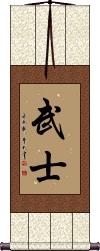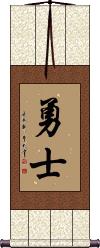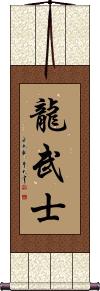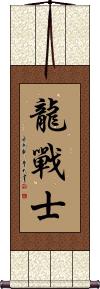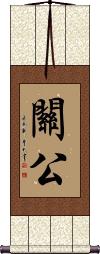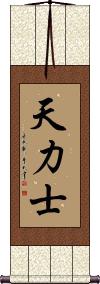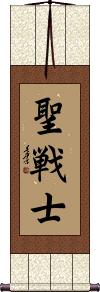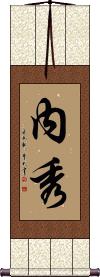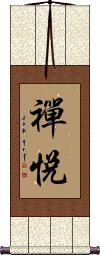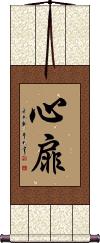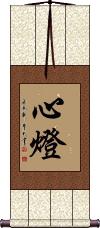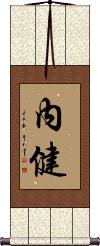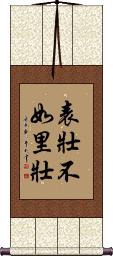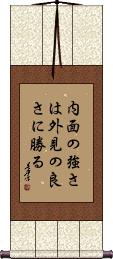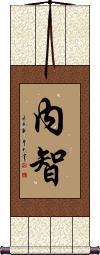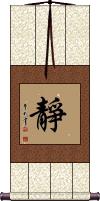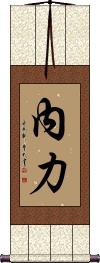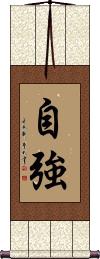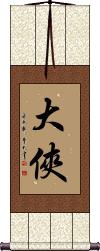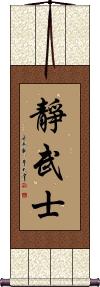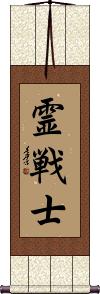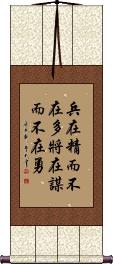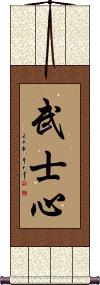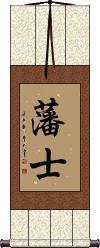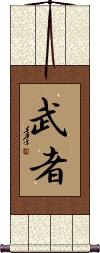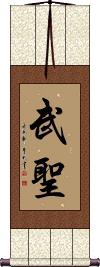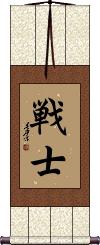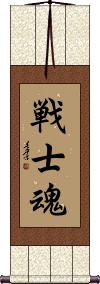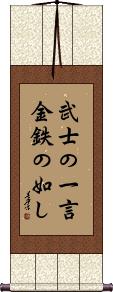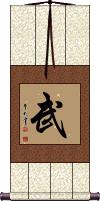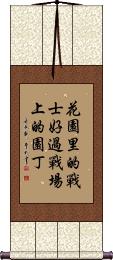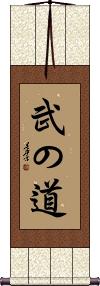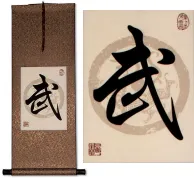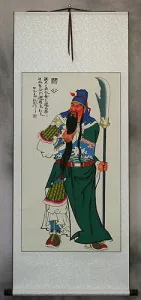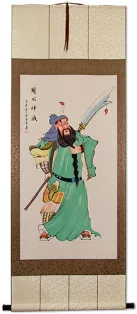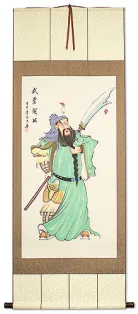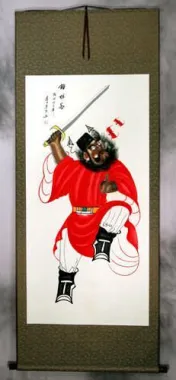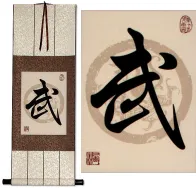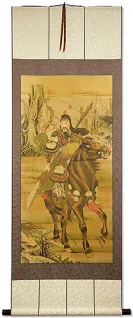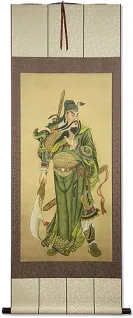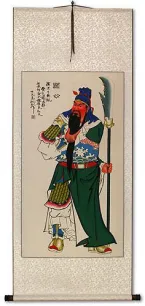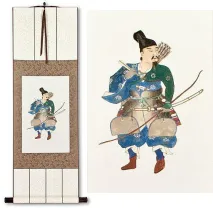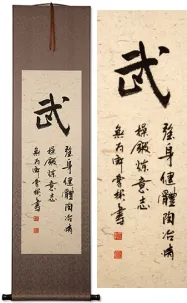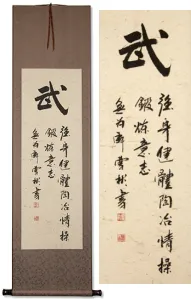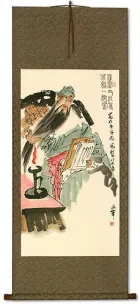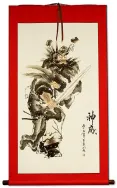Many custom options...
And formats...

Inner Warrior in Chinese / Japanese...
Buy an Inner Warrior calligraphy wall scroll here!
Personalize your custom “Inner Warrior” project by clicking the button next to your favorite “Inner Warrior” title below...
See also: Bushido - Code of the Samurai Warrior
Switched to secondary search mode due to lack of results using primary.
These secondary results may not be very accurate. Try a different but similar meaning word or phrase for better results. Or...
Look up Inner Warrior in my Japanese Kanji & Chinese Character Dictionary(My dictionary is a different system then the calligraphy search you just tried)
If you want a special phrase, word, title, name, or proverb, feel free to contact me, and I will translate your custom calligraphy idea for you.
1. Warrior
3. Daredevil Warrior / Soul of a Warrior
10. Holy Warrior
11. Inner Beauty / Beauty of Spirit
12. Inner Beauty / Inner Wisdom
13. Inner Bliss and Peace from Meditation
15. Inner Light / Intelligence
16. Intuitive Wisdom / Inner Light
17. Inner Strength / Inner Well-Being and Health
18. Inner Strength is Better than Outward Appearance
19. Inner Wisdom
20. Inner Peace
21. Inner Peace / Silence / Serenity
22. Achieve Inner Peace; Find Deep Understanding
23. Inner Strength
24. Inner Strength / Self-Improvement
25. Inner Freedom
26. Inner Warrior
27. Noble Warrior
28. Peaceful Warrior
29. Quiet Warrior
30. Shadow Warrior
31. Silent Warrior
33. Always Striving for Inner Strength
36. Heart of a Warrior / Samurai Heart
37. Warrior of the Heavenly Realm
38. Warrior Monk / Soldier Priest
39. Warrior / Musha
40. Warrior of God / Soldier of God
41. Warrior Saint / Saint of War
43. Warrior Soul / Heroic Spirit
44. Warrior Soul / Spirit of a Fighter
45. Warrior Within
47. The Warrior’s Word, Dependable as Gold and Steel
49. Warrior Essence / Warrior Spirit / Martial
50. It is better to be a warrior in a garden than a gardener in a war
51. Warrior Scholar
52. Warrior’s Heart
53. Warrior’s Path
54. Wind Warrior
Warrior
The first character, 武, is the spirit or essence of a warrior. The second character, 士, means soldier, officer, or official. 武士 is also used appropriately enough to describe a piece of a chess game. 武士 can also be translated as a soldier, cavalier, palace guard, or samurai, and sometimes as a knight. I've occasionally seen this translated as strong man or tough man (gender not necessarily implied).
By far, 武士 is the most common way to write warrior in Chinese characters, Japanese Kanji, and old Korean Hanja.
Note: In Japanese, this is Bushi, as in Bushido.
Brave Warrior
勇士 is the Chinese, Japanese Kanji, and old Korean Hanja for a brave warrior, a brave person, a hero, or a brave man.
In Japanese, this can be a given name, Yuuji.
Daredevil Warrior / Soul of a Warrior
鬼武者 is an unusual title that can be translated two ways, daredevil warrior or demon warrior.
The most common is probably the daredevil warrior. However, the first character means demon, ghost, or soul of the departed. Therefore, it can mean the soul of a warrior or a demon warrior.
This title is Japanese only, and should not be used if your audience is Chinese.
Dragon Warrior
Dragon Warrior
Dragon Warrior
Enlightened Warrior
覺醒武士 is not a commonly used title in Chinese but is sometimes used in Martial arts and military contexts to refer to a warrior who seems always to be fully aware, enlightened, knowledgeable, noble, and just.
The first two characters are a word that means: to awaken; to come to realize; awakened to the truth; the truth dawns upon one; scales fall from the eyes; to become aware.
The last two characters mean warrior but can also refer to a samurai, soldier, or fighter.
Ghost Warrior
Guan Gong / Warrior Saint
關公 is a Chinese title, Guan Gong, that means Lord Guan (The warrior saint of ancient China).
 While his real name was Guan Yu / 關羽, he is commonly known by the title of Guan Gong (關公).
While his real name was Guan Yu / 關羽, he is commonly known by the title of Guan Gong (關公).
Some Chinese soldiers still pray to Guan Gong for protection. They would especially do this before going into battle. Statues of Guan Gong are seen throughout China.
Heart of a Warrior
Warrior of Heaven
天力士 means “Heavenly Warrior,” or “Hero of Heaven,” in Chinese, old Korean, and Japanese.
Often used in a Buddhist context.
Holy Warrior
Inner Beauty / Beauty of Spirit
Inner Beauty / Beauty of Spirit
Inner Beauty / Inner Wisdom
Inner Bliss and Peace from Meditation
禪悅 is a title that refers to the inner bliss and peace you can achieve from meditation.
This term transcends a few religions, including Taoism and Buddhism. It can also be translated as “joy of the mystic trance” or simply “meditative bliss.”
Amazing that such a complex idea can be expressed in just two Chinese characters. Note that the first character is Chan/Zen (Chinese/Japanese), which means “meditation” in both languages.
Inner Heart / Inner Soul
Inner Light / Intelligence
Intuitive Wisdom / Inner Light
Inner Strength / Inner Well-Being and Health
Inner Strength is Better than Outward Appearance
表壯不如里壯 literally translates as: [Better to be] strong inside than [to be] strong outside.
The ancient original meaning was:
[An] able [husband] outside [working to support a family is] not as good as [an] able [wife] inside [working and saving to take care of the family].
The current meaning is:
Inner strength is more important than outward appearance.
Inner Strength is Better than Outward Appearance
内面の強さは外見の良さに勝る is a Japanese proverb that literally translates as “inner/internal strength/power [versus] outward-appearance [the] merit/virtue/good quality [does] excel/surpass/exceed/outweigh.”
More naturally in English, this would be “Inner Strength Outweighs Outward Appearance.”
Note: Because this selection contains some special Japanese Hiragana characters, it should be written by a Japanese calligrapher.
Inner Wisdom
Inner Peace
內心平靜 is a Chinese and Japanese phrase that is a direct translation of the western idea of inner peace.
The first two characters contain the idea of “heart,” “innermost being,” or “deep in the/your inner mind.”
The last two characters mean “tranquil” and “serene.”
I have seen this phrase used as “inner peace” for art prints and even on the side of coffee cups. But I think the translation is too literal. It feels like a direct translation from English rather than a nicely composed Chinese or Japanese phrase. See my other entries for “inner peace.”
See Also: Serenity | Simplicity | Peace
Inner Peace / Silence / Serenity
靜 is the simplest way to convey the meaning of inner peace and serenity.
靜 is often translated as “serenity.” It can also be used to express the ideas of still, calm, serene, quiet, silent, stillness, not moving, or tranquility.
In the old days, Chinese, Japanese, or Korean people might hang a wall scroll with this character in their reading room to bring about a sense of peace in the room.
![]() While they once used the same character form in Japan, they now use a slightly-simplified version in modern Japan (after WWII). This version is shown to the right, and can be selected for your wall scroll by clicking on that Kanji instead of the button above.
While they once used the same character form in Japan, they now use a slightly-simplified version in modern Japan (after WWII). This version is shown to the right, and can be selected for your wall scroll by clicking on that Kanji instead of the button above.
See Also: Peace
Achieve Inner Peace; Find Deep Understanding
寧靜而致遠 is five characters from a longer ten-character proverb composed by Zhuge Liang about 1800 years ago.
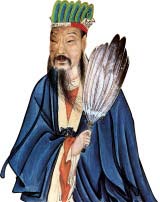
诸葛亮 Zhuge Liang
The proverb means “Your inner peace/tranquility/serenity will help you see or reach far (into the world).”
The last word means “far” but the deeper meaning is that you will surpass what you can currently see or understand. Perhaps even opening up vast knowledge and understanding of complex ideas.
Inner Strength
內在力量 is the slightly-verbose way to say inner strength.
The first two characters mean “intrinsic” or “inner.” The second two characters mean “power,” “force” or “strength” (especially physical strength). 內在力量 is more a short phrase rather than just a word in Chinese and Korean. This can sort of be understood in Japanese but it's not normal/proper Japanese.
Inner Strength
內力 is the shorter version of inner strength (can also be translated as “internal force”). The first character holds the meaning of “inner” or “internal.” The second character means “power,” “force,” or “strength.”
內力 is a Kung Fu way of talking about an inner power or strength from within. This is a way to express “inner chi.” This is something that you might hear in a real Chinese Kung Fu movie.
While understood in Chinese and Japanese, this can have a secondary meaning of “inner stress” in Japanese.
Inner Strength / Self-Improvement
自強 is the kind of inner strength that applies to a person who has will-power and can inspire themselves to do great things.
自強 can also be the creed of a person that always pursues self-improvement.
Other translations: self-strengthening, striving for improvement, self-improvement, striving to become stronger, and self-renewal.
Inner Freedom
Inner Freedom
Inner Warrior
Inner Warrior
Noble Warrior
Peaceful Warrior
平和的武士 means “Peaceful Warrior” in Chinese. This does in fact sound like an oxymoron in Chinese - but many of you have asked for this special title.
Note this is not the same thing as “warrior for peace.”
See Also: Peace
Peaceful Warrior
平和の武士 can be read as “Peaceful Warrior” or “Warrior for Peace” in Japanese. This sounds like an oxymoron in Japanese, so it's a weird title. Expect Japanese people to be perplexed when they see it.
Character breakdown:
平和 (heiwa) peace; harmony.
の (no) possessive particle.
武士 (bushi) warrior; samurai; soldier.
Quiet Warrior
靜武士 is the shortest way to write “Quiet Warrior” or “Tranquil Warrior” in Chinese.
See Also: Peaceful Warrior
Quiet Warrior
Quiet Warrior
靜謐武士 means “Quiet Warrior” in Chinese.
靜謐 means quiet or tranquil.
武士 means warrior or soldier.
See Also: Peaceful Warrior
Shadow Warrior
影武者 is the title for Shadow Warrior in Chinese and Japanese.
This may refer to a few video games that share this English title, or a Japanese movie called Kagemusha.
If you are looking for the Japanese TV show, that was originally 影の軍団 (Kage no Gundan), which more literally means “Army of Shadows,” but was re-titled Shadow Warrior when released outside Japan in English.
In Japan, this title can also refer to a body double or decoy of an army general or leader used to avoid assassination. It can also be somebody who does all the work (or fighting) behind the scenes (not getting much, if any, credit).

Silent Warrior
Silent Warrior
Spiritual Warrior
Always Striving for Inner Strength
自強不息 is a proverb or idiom that suggests that the pursuit of self-improvement is eternal. It can also be a suggestion to strive unremittingly in life.
The first two characters mean inner strength with the idea of self-improvement. The last two characters mean “never rest” or “striving without giving up.”
Some will translate these four characters as “Exert and strive hard without any let-up.”
Warrior for Peace
和平武士 means “Warrior for Peace” (a warrior who fights for peace) in Chinese.
Note this is not the same thing as a “peaceful warrior.”
See Also: Peace
Value of Warrior Generals
兵在精而不在多將在謀而不在勇 is a proverb that informs how it is better to have warriors of quality, rather than just a large quantity of warriors in your army/force.
This literally means: [Just as] warriors [are valued for their] quality and not [just] for quantity, [so] generals [are valued] for their tactics, not [just] for [their] bravery.
See Also: 兵在精而不在多
Heart of a Warrior / Samurai Heart
Warrior of the Heavenly Realm
天界力士 means “warrior of the heavenly realm” in Chinese, old Korean Hanja, and Japanese Kanji.
This is also known as Narayana in Buddhism.
Warrior Monk / Soldier Priest
Warrior / Musha
Warrior of God / Soldier of God
Warrior Saint / Saint of War
Warrior / Fighter
Senshi
Warrior Soul / Heroic Spirit
勇士精神 can be translated as the warrior's spirit or warrior's soul. The first two characters can be translated as “warrior” or literally “brave soldier/man,” although some will translate this word as “hero.” Therefore, this is also how to say “heroic spirit.”
The second two characters mean vigor, vitality, drive, spirit, mind, heart, mental essence, and psychological component. Basically “your soul.”
We have two versions of this phrase. The only difference is the first two and last two characters are swapped. The version here suggests that you admire or like the idea of the spirit of a warrior. The other version suggests that you are the warrior or hero.
Warrior Soul / Spirit of a Fighter
Warrior Within
The Warrior Within
The Warrior’s Word, Dependable as Gold and Steel
武士の一言金鉄の如し is an old Japanese proverb about the value of the word of a warrior.
Here are a couple of versions of how this can be translated:
A warrior's single word is as unchanging and reliable as gold and steel.
A warrior's promise is as dependable as gold, and his [scabbard contains] untarnished steel (a sword).
Note: Sometimes this phrase is written as 男子の一言、金鉄の如し (danshi no ichigon kintetsu no gotoshi)
Note: Because this selection contains some special Japanese Hiragana characters, it should be written by a Japanese calligrapher.
Soul of a Warrior
精神勇士 can be translated as the spirit or soul of a warrior. The first two characters can be translated as vigor, vitality, drive, spirit, mind, heart, mental essence, and psychological component. Basically, “your soul.”
The second two characters mean “warrior” or literally “brave soldier/man,” although some will translate this word as “hero.” Therefore, this is also how to say “soul of a hero.”
Note: This title is best for Chinese and old Korean. It does make sense in Japanese but is not a common or natural Kanji combination in Japanese.
We have two versions of this phrase. The only difference is the first two and last two characters are swapped. The version here suggests that you are the warrior or hero. The other version suggests that you admire or like the idea of the spirit of a warrior.
Warrior Essence / Warrior Spirit / Martial
武 is the essence or spirit of a warrior. 武 is part of the word “wu shu” which is sometimes translated as “martial arts” or “kung fu.”
In more modern speech and another context, this can mean military, martial, warlike, fierce, and perhaps violent but usually as a prefix for a longer word or phrase.
It is better to be a warrior in a garden than a gardener in a war
花園里的戰士好過戰場上的園丁 is the Chinese for the phrase, “It is better to be a warrior in a garden than a gardener in a war.”
This proverb is purported to come from the following exchange:
A student approaches his samurai master and says,
“Teacher, you instruct me how to fight, yet you preach to me about peace. How do I reconcile the two?”
The samurai responds,
“Because it is better to be a warrior in a garden than a gardener in a war.”
Warrior Scholar
Warrior’s Heart
Warrior’s Path
Wind Warrior
This in-stock artwork might be what you are looking for, and ships right away...
Gallery Price: $31.00
Your Price: $16.88
Gallery Price: $90.00
Your Price: $49.88
Gallery Price: $200.00
Your Price: $79.88
Gallery Price: $47.00
Your Price: $26.00
Gallery Price: $158.00
Your Price: $87.77
Gallery Price: $158.00
Your Price: $87.77
Guan Gong Warrior Saint
Large Wall Scroll
Discounted Blemished
Gallery Price: $71.00
Your Price: $39.00
Gallery Price: $108.00
Your Price: $59.88
The following table may be helpful for those studying Chinese or Japanese...
| Title | Characters | Romaji (Romanized Japanese) | Various forms of Romanized Chinese | |
| Warrior | 武士 | bu shi / bushi | wǔ shì / wu3 shi4 / wu shi / wushi | wu shih / wushih |
| Brave Warrior | 勇士 | yuu shi / yuushi / yu shi | yǒng shì / yong3 shi4 / yong shi / yongshi | yung shih / yungshih |
| Daredevil Warrior Soul of a Warrior | 鬼武者 | oni mu sha / onimusha | ||
| Dragon Warrior | 龍武士 龙武士 | ryuu bu shi ryuubushi ryu bu shi | lóng wǔ shì long2 wu3 shi4 long wu shi longwushi | lung wu shih lungwushih |
| Dragon Warrior | 龍戰士 龙战士 | lóng zhàn shì long2 zhan4 shi4 long zhan shi longzhanshi | lung chan shih lungchanshih |
|
| Dragon Warrior | 斗龍戰士 斗龙战士 | dòu lóng zhàn shì dou4 long2 zhan4 shi4 dou long zhan shi doulongzhanshi | tou lung chan shih toulungchanshih |
|
| Enlightened Warrior | 覺醒武士 觉醒武士 | jué xǐng wǔ shì jue2 xing3 wu3 shi4 jue xing wu shi juexingwushi | chüeh hsing wu shih chüehhsingwushih |
|
| Ghost Warrior | 幽靈戰士 幽灵战士 | yōu líng zhàn shì you1 ling2 zhan4 shi4 you ling zhan shi youlingzhanshi | yu ling chan shih yulingchanshih |
|
| Guan Gong Warrior Saint | 關公 关公 | guān gōng guan1 gong1 guan gong guangong | kuan kung kuankung |
|
| Heart of a Warrior | 戰士之心 战士之心 | zhàn shì zhī xīn zhan4 shi4 zhi1 xin1 zhan shi zhi xin zhanshizhixin | chan shih chih hsin chanshihchihhsin |
|
| Warrior of Heaven | 天力士 | ten riki shi tenrikishi | tiān lì shì tian1 li4 shi4 tian li shi tianlishi | t`ien li shih tienlishih tien li shih |
| Holy Warrior | 聖戦士 | sei senshi / seisenshi | ||
| Inner Beauty Beauty of Spirit | 內在美 内在美 | nèi zài měi nei4 zai4 mei3 nei zai mei neizaimei | nei tsai mei neitsaimei |
|
| Inner Beauty Beauty of Spirit | 内面美 | nai men bi / naimenbi | ||
| Inner Beauty Inner Wisdom | 內秀 内秀 | nèi xiù / nei4 xiu4 / nei xiu / neixiu | nei hsiu / neihsiu | |
| Inner Bliss and Peace from Meditation | 禪悅 禅悦 | chán yuè / chan2 yue4 / chan yue / chanyue | ch`an yüeh / chanyüeh / chan yüeh | |
| Inner Heart Inner Soul | 心扉 | xīn fēi / xin1 fei1 / xin fei / xinfei | hsin fei / hsinfei | |
| Inner Light Intelligence | 心燈 心灯 | shin tou / shintou / shin to | xīn dēng / xin1 deng1 / xin deng / xindeng | hsin teng / hsinteng |
| Intuitive Wisdom Inner Light | 一道神光 | ichidou no shinkou ichidounoshinkou ichido no shinko | yī dào shén guāng yi1 dao4 shen2 guang1 yi dao shen guang yidaoshenguang | i tao shen kuang itaoshenkuang |
| Inner Strength Inner Well-Being and Health | 內健 | nèi jiàn / nei4 jian4 / nei jian / neijian | nei chien / neichien | |
| Inner Strength is Better than Outward Appearance | 表壯不如里壯 表壮不如里壮 | biǎo zhuàng bù rú lǐ zhuàng biao3 zhuang4 bu4 ru2 li3 zhuang4 biao zhuang bu ru li zhuang biaozhuangburulizhuang | piao chuang pu ju li chuang piaochuangpujulichuang |
|
| Inner Strength is Better than Outward Appearance | 内面の強さは外見の良さに勝る | naimen no tsuyosa ha gaiken no yosa ni masaru | ||
| Inner Wisdom | 內智 内智 | nai chi / naichi | nèi zhì / nei4 zhi4 / nei zhi / neizhi | nei chih / neichih |
| Inner Peace | 內心平靜 内心平静 | naishin heizyou naishinheizyou naishin heizyo | nèi xīn píng jìng nei4 xin1 ping2 jing4 nei xin ping jing neixinpingjing | nei hsin p`ing ching neihsinpingching nei hsin ping ching |
| Inner Peace Silence Serenity | 靜 静 | shizu / sei | jìng / jing4 / jing | ching |
| Achieve Inner Peace; Find Deep Understanding | 寧靜而致遠 宁静而致远 | níng jìng ér zhì yuǎn ning2 jing4 er2 zhi4 yuan3 ning jing er zhi yuan ningjingerzhiyuan | ning ching erh chih yüan ningchingerhchihyüan |
|
| Inner Strength | 內在力量 内在力量 | nèi zài lì liàng nei4 zai4 li4 liang4 nei zai li liang neizaililiang | nei tsai li liang neitsaililiang |
|
| Inner Strength | 內力 内力 | nai ryoku / nairyoku | nèi lì / nei4 li4 / nei li / neili | |
| Inner Strength Self-Improvement | 自強 自强 | zì qiáng / zi4 qiang2 / zi qiang / ziqiang | tzu ch`iang / tzuchiang / tzu chiang | |
| Inner Freedom | 內心自由 内心自由 | nèi xīn zì yóu nei4 xin1 zi4 you2 nei xin zi you neixinziyou | nei hsin tzu yu neihsintzuyu |
|
| Inner Freedom | 內在自由 内在自由 | nèi zài zì yóu nei4 zai4 zi4 you2 nei zai zi you neizaiziyou | nei tsai tzu yu neitsaitzuyu |
|
| Inner Warrior | 內心戰士 内心战士 | nèi xīn zhàn shì nei4 xin1 zhan4 shi4 nei xin zhan shi neixinzhanshi | nei hsin chan shih neihsinchanshih |
|
| Inner Warrior | 內なる戦士 内なる戦士 | |||
| Noble Warrior | 大俠 大侠 | dà xiá / da4 xia2 / da xia / daxia | ta hsia / tahsia | |
| Peaceful Warrior | 平和的武士 | píng hé de wǔ shì ping2 he2 de wu3 shi4 ping he de wu shi pinghedewushi | p`ing ho te wu shih pinghotewushih ping ho te wu shih |
|
| Peaceful Warrior | 平和の武士 | hei wa no bu shi heiwanobushi | ||
| Quiet Warrior | 靜武士 静武士 | jìng wǔ shì jing4 wu3 shi4 jing wu shi jingwushi | ching wu shih chingwushih |
|
| Quiet Warrior | 靜かな戦士 静かな戦士 | shizukana senshi shizukanasenshi | ||
| Quiet Warrior | 靜謐武士 静谧武士 | jìng mì wǔ shì jing4 mi4 wu3 shi4 jing mi wu shi jingmiwushi | ching mi wu shih chingmiwushih |
|
| Shadow Warrior | 影武者 | kagemusha | yīng wǔ zhǔ ying1 wu3 zhu3 ying wu zhu yingwuzhu | ying wu chu yingwuchu |
| Silent Warrior | 沉默的武士 | chén mò de wǔ shì chen2 mo4 de wu3 shi4 chen mo de wu shi chenmodewushi | ch`en mo te wu shih chenmotewushih chen mo te wu shih |
|
| Silent Warrior | 靜寂な戦士 静寂な戦士 | seijakuna senshi seijakunasenshi | ||
| Spiritual Warrior | 霊戦士 | rei sen shi reisenshi | ||
| Always Striving for Inner Strength | 自強不息 自强不息 | zì qiáng bú xī zi4 qiang2 bu2 xi1 zi qiang bu xi ziqiangbuxi | tzu ch`iang pu hsi tzuchiangpuhsi tzu chiang pu hsi |
|
| Warrior for Peace | 和平武士 | hé píng wǔ shì he2 ping2 wu3 shi4 he ping wu shi hepingwushi | ho p`ing wu shih hopingwushih ho ping wu shih |
|
| Value of Warrior Generals | 兵在精而不在多將在謀而不在勇 兵在精而不在多将在谋而不在勇 | bīng zài jīng ér bú zài duō jiàng zài móu ér bú zài yǒng bing1 zai4 jing1 er2 bu2 zai4 duo1 jiang4 zai4 mou2 er2 bu2 zai4 yong3 bing zai jing er bu zai duo jiang zai mou er bu zai yong | ping tsai ching erh pu tsai to chiang tsai mou erh pu tsai yung | |
| Heart of a Warrior Samurai Heart | 武士心 | bu shi kokoro bushikokoro | wǔ shì xīn wu3 shi4 xin1 wu shi xin wushixin | wu shih hsin wushihhsin |
| Warrior of the Heavenly Realm | 天界力士 | ten kai riki shi tenkairikishi | tiān jiè lì shì tian1 jie4 li4 shi4 tian jie li shi tianjielishi | t`ien chieh li shih tienchiehlishih tien chieh li shih |
| Warrior Monk Soldier Priest | 藩士 | sou hei / souhei / so hei | sēng bīng seng1 bing1 seng bing sengbing | seng ping sengping |
| Warrior Musha | 武者 | mu sha / musha | ||
| Warrior of God Soldier of God | 神の兵士 | kami no heishi kaminoheishi | ||
| Warrior Saint Saint of War | 武聖 武圣 | wǔ shèng / wu3 sheng4 / wu sheng / wusheng | ||
| Warrior Fighter | 戦士 | sen shi / senshi | ||
| Warrior Soul Heroic Spirit | 勇士精神 | yǒng shì jīng shén yong3 shi4 jing1 shen2 yong shi jing shen yongshijingshen | yung shih ching shen yungshihchingshen |
|
| Warrior Soul Spirit of a Fighter | 戦士魂 | senshi damashii senshidamashii senshi damashi | ||
| Warrior Within | 武者之心 | wǔ zhě zhī xīn wu3 zhe3 zhi1 xin1 wu zhe zhi xin wuzhezhixin | wu che chih hsin wuchechihhsin |
|
| The Warrior Within | 中の戦士 | chuu no senshi chuunosenshi chu no senshi | ||
| The Warrior’s Word, Dependable as Gold and Steel | 武士の一言、金鉄の如し | bushi no ichigon kintetsu no gotoshi | ||
| Soul of a Warrior | 精神勇士 | jīng shén yǒng shì jing1 shen2 yong3 shi4 jing shen yong shi jingshenyongshi | ching shen yung shih chingshenyungshih |
|
| Warrior Essence Warrior Spirit Martial | 武 | bu | wǔ / wu3 / wu | |
| It is better to be a warrior in a garden than a gardener in a war | 花園里的戰士好過戰場上的園丁 花园里的战士好过战场上的园丁 | huā yuán lǐ de zhàn shì hǎo guò zhàn chǎng shàng de yuán dīng huā yuán lǐ de zhàn shì hǎo guò zhàn chǎng shàng de yuán dīng ài wēng huā yuán lǐ de zhàn shì hǎo guò zhàn chǎng shàng de yuán dīng hua1 yuan2 li3 de zhan4 shi4 hao3 guo4 zhan4 chang3 shang4 de yuan2 ding1 hua1 yuan2 li3 de zhan4 shi4 hao3 guo4 zhan4 chang3 shang4 de yuan2 ding1 ai4 weng1 hua1 yuan2 li3 de zhan4 shi4 hao3 guo4 zhan4 chang3 shang4 de yuan2 ding1 hua yuan li de zhan shi hao guo zhan chang shang de yuan ding hua yuan li de zhan shi hao guo zhan chang shang de yuan ding ai weng hua yuan li de zhan shi hao guo zhan chang shang de yuan ding | hua yüan li te chan shih hao kuo chan ch`ang shang te yüan ting hua yüan li te chan shih hao kuo chan ch`ang shang te yüan ting ai weng hua yüan li te chan shih hao kuo chan ch`ang shang te yüan ting hua yüan li te chan shih hao kuo chan chang shang te yüan ting hua yüan li te chan shih hao kuo chan chang shang te yüan ting ai weng hua yüan li te chan shih hao kuo chan chang shang te yüan ting |
|
| Warrior Scholar | 戰士學者 战士学者 | zhàn shì xué zhě zhan4 shi4 xue2 zhe3 zhan shi xue zhe zhanshixuezhe | chan shih hsüeh che chanshihhsüehche |
|
| Warrior’s Heart | 勇士之心 | yǒng shì zhī xīn / / | ||
| Warrior’s Path | 武の道 | bu no dou / bunodou / bu no do | ||
| Wind Warrior | 風中戰士 风中战士 | fēng zhōng zhàn shì feng1 zhong1 zhan4 shi4 feng zhong zhan shi fengzhongzhanshi | feng chung chan shih fengchungchanshih |
|
| In some entries above you will see that characters have different versions above and below a line. In these cases, the characters above the line are Traditional Chinese, while the ones below are Simplified Chinese. | ||||
Successful Chinese Character and Japanese Kanji calligraphy searches within the last few hours...
